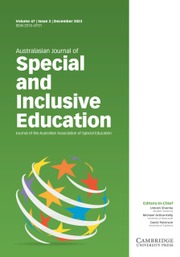Article contents
Parental Involvement in Supporting Their Children with Special Educational Needs at School and Home in Bhutan
Published online by Cambridge University Press: 21 May 2019
Abstract
This paper reports the findings from a study investigating Bhutanese parents’ involvement in supporting their children with special educational needs (SEN) in schooling. The interaction between the parents themselves in supporting each other was also explored. Individual interviews were conducted with 26 parents (13 fathers and 13 mothers) of children with either full inclusion or partial inclusion in 3 schools located in 3 regions (urban, semi-urban, and rural) and analysed using manual thematic coding and Leximancer text mining software. Of Epstein’s (1987) 6 types of parental involvement activities in education, these parents reported their actions to be parenting, volunteering in schools, supporting learning and development at home, and collaborating with the community. The minimal interaction among the parents was mostly between the stay-in-school urban mothers who had consistent but impromptu and informal interactions. The implications of this study inform the need for schools to respond to policy and to actively engage parents, and for education programs and support groups to be set up to strengthen parental involvement in the education of children with SEN in Bhutan.
- Type
- Original Articles
- Information
- Australasian Journal of Special and Inclusive Education , Volume 43 , Issue 1 , July 2019 , pp. 54 - 68
- Copyright
- © The Author(s) 2019
Footnotes
This manuscript was accepted under the Editorship of Umesh Sharma.
References
- 8
- Cited by


